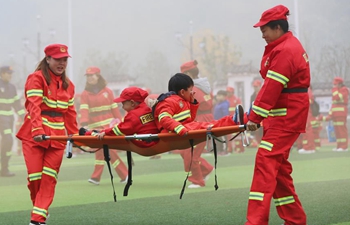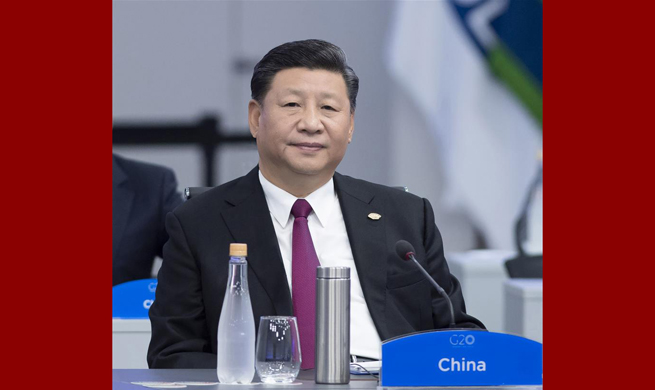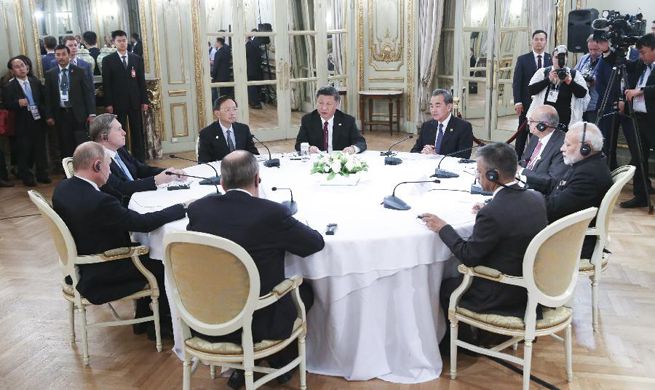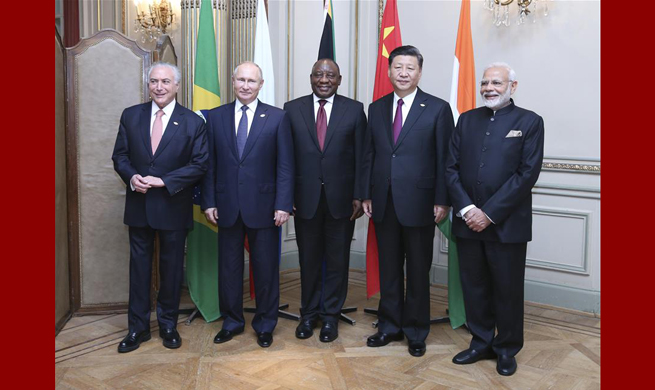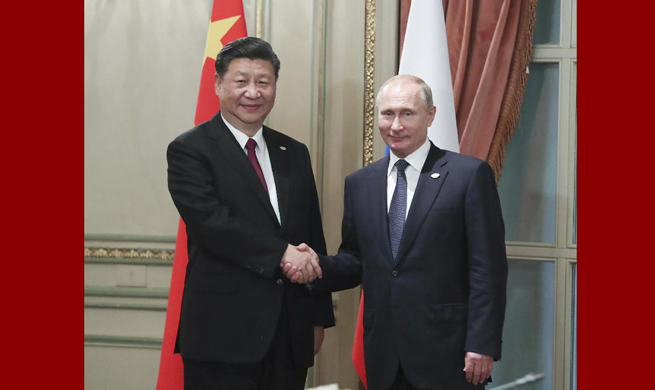by Murad Abdo
ADEN, Yemen, Dec. 1 (Xinhua) -- The two-warring Yemeni sides agreed to engage in a new peace talks sponsored by the United Nations (UN) in Sweden in the few upcoming days in a fresh attempt to end the years-long conflict in the impoverished Arab country.
The Saudi-backed Yemeni government sent a letter through its Foreign Ministry to the UN Special Envoy for Yemen Martin Griffiths, declaring its full commitment to participating in the peace talks with a complete negotiating team.
High-ranking leaders of the Iranian-backed Houthi group based in Sanaa also pledged to dispatch delegates to Sweden's peace negotiations.
Mohammed Ali al-Houthi, head of Houthi Higher Revolutionary Committee, said in his official Twitter account that "our delegation will be in Sweden on Dec. 3 if guarantees remain to ensure that they can depart and return to Yemen."
The same preconditions led to the failure in convening talks in September when Houthis demanded for guarantees that their plane would not be inspected and some of their wounded to be evacuated to receive treatment abroad.
The commitments fueled speculation about the revival of the long-stalled talks which aimed at ending the ongoing civil war that killed thousands of people and caused destruction to the country's infrastructure.
Yemeni analysts and politicians believe that the road to the success of the new peace negotiations will not be paved with flowers and a number of obstacles are looming on the horizon.
Abdul-Raqeeb Hidyani, a political analyst and writer, said most of the Yemeni people don't expect a lot from Sweden's peace talks because they used to see failure during all previous negotiations facilitated by the UN.
He said that one of the major obstacles for achieving success in the upcoming talks is the Houthis insistence on placing preconditions for attending the negotiations table.
Furthermore, he mentioned that the regional interventions may also obstruct the decision-making process for the internal Yemeni factions willing to end the fighting through politics.
Hidyani also spoke about obstacles including the Houthis strong refusal to hand over the strategic Red Sea port city of Hodeidah and its seaport to the internationally-recognized government.
Mansour Saleh, a prominent political analyst based in Aden, said that achieving peace in Yemen is not linked to the two-warring sides but to the international community with a real desire to find it necessary to end this devastating war.
"Houthis are experiencing difficult times and will rush to get a political solution to ensure and save their ruling power as well as existence in northern provinces in the future," Saleh said.
Yemen's newly-appointed Prime Minister Maeen Abdulmalik met with visiting UN Under-Secretary-General for Humanitarian Affairs Mark Lowcock on Friday.
The prime minister said that "the Houthis only accept to go to peace talks in order to deceive the international community and they go only certain steps in any peace talks before big troubles emerge."
Nabil Albukiri, a researcher in international strategies, described the UN-sponsored talks as an international attempt to cease the fighting in Yemen for a short temporary period but not to end it permanently.
Albukiri said that Sweden's talks will create new rounds of military conflict afterwards because the major causes of the war are ignored. The talks will only discuss the results and the humanitarian consequences of the war.
"This is not a good and real introduction to finding a permanent solution for Yemen's conflict because the UN-backed talks jump over the major roots of the issue," he said.
"The upcoming negotiations in Sweden will definitely face failure like the previous rounds of peace talks and fighting will continue to end the Houthi coup militarily," Albukiri added.
Another obstacle facing the UN-sponsored talks comes from the pro-secesssion Southern Transitional Council (STC) that totally rejects any attempt to pass over the southern people's issue and their sole political representative in any upcoming negotiations.
Salim Thabit, the STC's official spokesman, said that "ignoring the southern people's aspirations and depriving them from the their legitimate rights in choosing their future will not achieve peace in Yemen."
He added that Griffiths held a series of meetings with all the warring factions involved in the country's military conflict but completely avoided listening to the the STC's voice that represents the southern people.
The Aden-based STC plays a big role on-ground as it controls the southern port city of Aden and other neighboring main cities through its newly-recruited troops backed by the United Arab Emirates (UAE).
Hussein Laqwar, a politician and observer, said that all the indications and facts don't suggest that Sweden's negotiations will achieve a real breakthrough for the country's complicated crisis.
"All the Yemeni negotiating factions don't share the same purpose or goals from convening the UN-led talks in Sweden," Laqwar said.
He added that "the UN envoy is ignoring the current situation created following the war in southern Yemen, making the next negotiations more closer to failure than to success."
The impoverished Arab country has been locked into a civil war since the Iranian-backed Shiite Houthi rebels overran much of the country militarily and seized all northern provinces, including capital Sanaa, in 2014.
Saudi Arabia leads an Arab military coalition that intervened in Yemen in 2015 to support the government of President Abd-Rabbu Mansour Hadi after Iran-backed Houthi rebels forced him into exile.
The UN has listed Yemen as the world's number one humanitarian crisis, with seven million Yemenis on the brink of famine and cholera causing more than 2,000 deaths.




